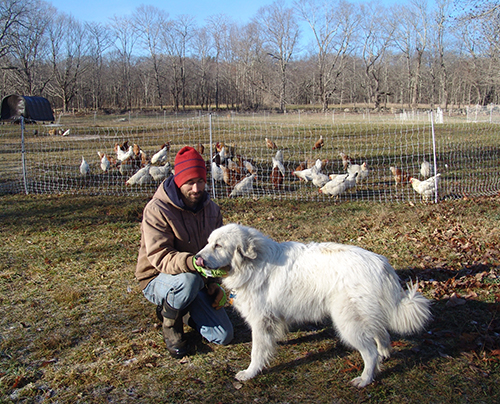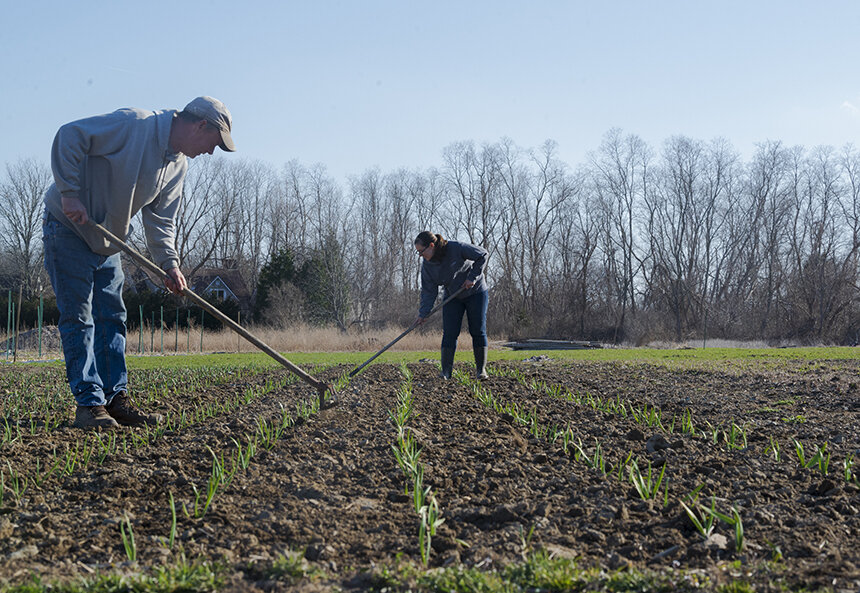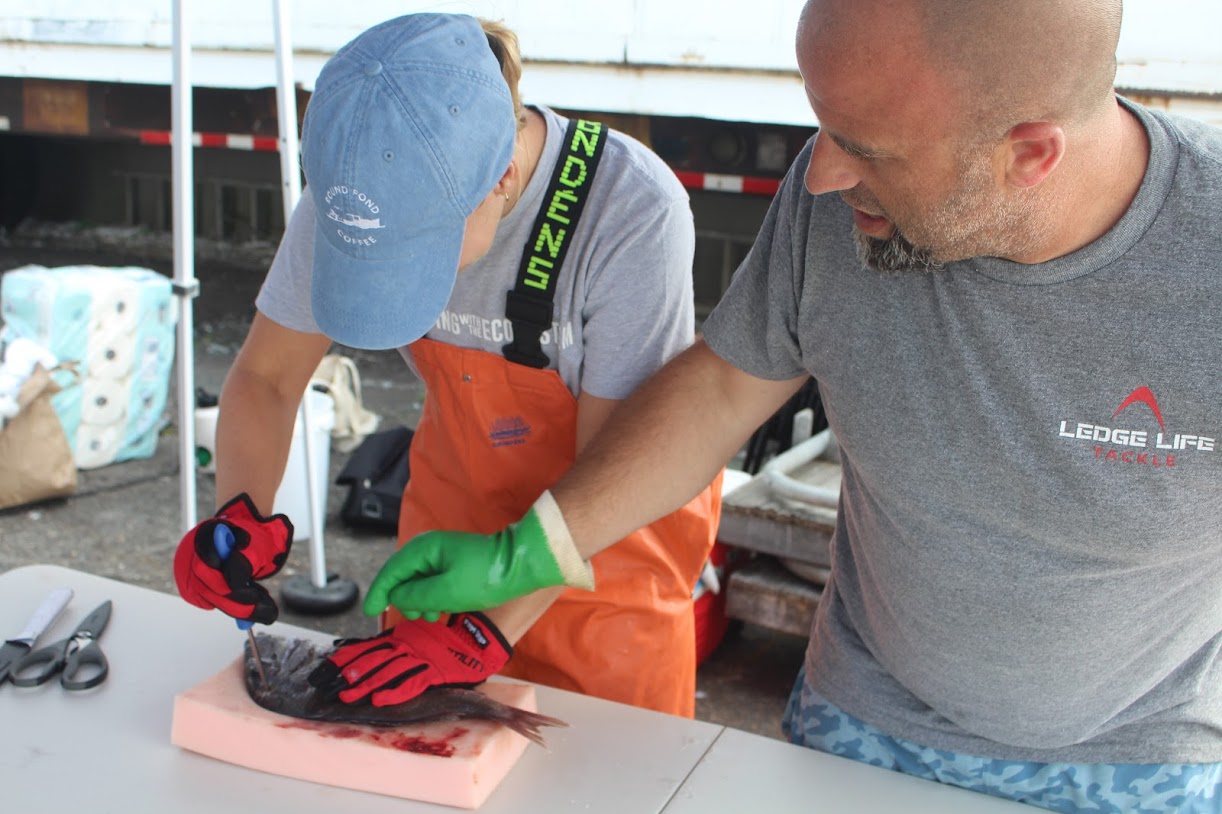Exeter Farm Focuses on Health of Everyone, Everything
December 19, 2016
EXETER, R.I. — Ben Coerper had been told that running a farm is like being an orchestra conductor. The South Carolina native had worked and apprenticed at farms in California and on the islands of Martha’s Vineyard and Saint Croix, but it wasn’t until he began running his own operation four years ago that the metaphor became apt.
“The animals do all the work,” the 34-year-old told ecoRI News during a late-November visit to the rural Rhode Island farm he runs with his fiancée, Jamestown native Rachael Slattery. “We just have to make sure we put them in the right place at the right time.”
In fact, the affable Coerper admitted that Bud, a horse in his late-20s, does most of the work, and much of the teaching. Bud drags logs, as the largely wooded property requires timber stand improvement, and pulls the sugar wagon when it’s maple-syrup time.
“Bud taught us how to work,” said Coerper of the farm’s first horse, introduced to the operation three years ago. “He knows what he’s doing, and he has this sixth sense of knowing what I’m thinking and feeling. At first I thought he was stubborn when he didn’t want to work, but I began to discover that he wasn’t going to work with me when I was stressed or something was bothering me. He wants nothing to do with you if you aren’t right.”
Bud might be the farm’s workhorse, and Coerper’s therapist, but the couple has poured their blood, sweat and tears into the farm. Coerper also drained his savings building the type of farm he and Slattery visioned.
The mission of Wild Harmony Farm, operated on 1,000 acres of leased land off Victory Highway, sounds simple: “Healthy Land. Healthy Animals. Healthy People.” But such an undertaking is easier said than done, especially when fast, cheap food continues to dominate the marketplace. Also, organic feed isn’t cheap. Coerper had to build three silos to hold the grain, as the company will only deliver 15 tons at a time. Buying in bulk is 75 percent cheaper than buying bags.
To create three tiers of health, the farm, which features about 30 acres of open space, is a GMO-free operation that feeds only organic grains to its animals. The farm’s modest collection of cows — red devons from Watson Farm in Jamestown — horses, pigs and chickens also eat a lot of grass.
Coerper said the farm’s livestock is fed grass and organic grains to help minimize the quantity of toxic chemicals used in the United States, especially on factory farms and by monoculture operations. The animals are rotationally grazed in four fields — a time-intensive but ecosystem-friendly method that replenishes topsoil by maximizing the amount of organic matter (animal poop) being added to the pastures.
Nutritious grass grows in the naturally fertilized fields, the animals continue to chow down and the cycle keeps repeating, at least until winter arrives and imported organic hay from upstate New York and organic grain from Vermont fill out the menu.
The chickens are always no more than four days behind the cows, eating the larvae of face flies, a pest of cattle and horses, in the left-behind manure before the insects can mature and pester Bud.

The animals are moved out of a pasture when the grass is 6-8 inches high. They return when the grass is 1-1.5 feet high. No chemicals are used on the fields, the animals never have to be dewormed and anything that can be composted is, according to Coerper.
“You need a variety of animals to manage different aspects of the ecosystem,” Coerper said. “Chicken manure is excellent fertilizer, and cows are the best lawnmowers. All the animals have an important role when it comes to the health of the farm.”
During the summer, the farm is alive with some 900 animals, mostly meat chickens and laying hens. Two to three farm apprentices help out during this busy season. In the winter, things slow down. The number of animals drops considerably, and help dwindles to a few volunteers.
Late last month, the farm’s collection of animals, by Coerper’s count, included 60 pigs, two cows, 120 hens and their protector, Romeo, a 3-year-old Great Pyrenees who has to be the friendliest guard dog in history, and, of course, Bud.
The farm sells most of its beef, pork, chicken and eggs through a community-supported agriculture (CSA) program. The Green Grocer in Portsmouth sells some of the farm’s products, and an onsite farm store is open the first Thursday of the month from 4-7 p.m. Wild Harmony Farm also sells some lamb and turkey, and it used to have sheep, but Coerper said they are a lot of work for little money.
Coerper said pigs are the most profitable animal, and eggs don’t make the farm any money, despite selling for $7 a dozen. Since the cost of quality chicken feed is so high, he said he would have to sell a dozen eggs for $11 to make a profit, based on paying himself $10 an hour for his involvement.

Healthy choices
Coerper’s interests in college were music and religion — no surprise since his father is a music teacher and his mother a minister — but after a lengthy illness that took a while to be diagnosed, his focus veered toward healthy food.
He first became aware of his food choices when he became ill with a sinus infection a few years after graduating from Colby College in Maine. Over the course of a year, he was diagnosed with an array of conditions and illnesses and prescribed a host of medications.
Unsatisfied with the various diagnoses, Coerper visited a naturopath and was diagnosed with food allergies, in particular to milk, wheat and sugar. Rather than continue with his current diet, supplemented with medication, he changed his eating habits.
“I did a ton of research and I learned more than I should have about our food system. The system makes us unhealthy,” he said. “A lot of people are suffering because our food is so processed. The U.S. food system is broken. I basically stopped eating processed foods. It did heal me. I wanted to grow my own food.”
During his time working on different farms, Coerper learned about food systems and began to educate others about the harsh and often disturbing realities of mainstream food.
Growing up in Jamestown, led Slattery to a life of sailing and farming. The 30-year-old has spent most of the past decade traveling the world’s oceans working on a diverse group of vessels and earning the title of captain. But she has always been drawn to the idea of sustainable farming.
Wild Harmony Farm has become the platform from which Coerper and Slattery use to produce their own food and educate consumers about the importance of a local food system.
They haven’t yet broken even, however. Next year, they are hoping to finish in the black, but paying off four years of loss will take some time.
“Farmers can’t make a living,” Coerper said. “I have been told that 80 years ago you could make a living with 20 cows and a thousand chickens.”
To help pay the bills, both Slattery and Coerper work other jobs. Slattery currently spends much of March through November captaining an environmental tall ship, the Schooner Adventuress, out of Washington state. She’s also a licensed massage therapist. Coerper, meanwhile, plays in a mix of bands.
The couple slaughters the farm meat they eat themselves. That’s why they name few of the animals. “Slaughter is hard,” Coerper said. “That’s why we kill our own meat. I don’t want to forget that. It’s easy to drive up to the slaughterhouse, open up the trailer and drive away. We don’t want the idea of killing animals for food to become routine.”
Coerper tried vegetarianism, but he feels better with meat included in his diet, as long as it has been raised responsibly and respectably. Coerper and Slattery also grow vegetables and herbs for their own consumption.
As for the future of the farm, the couple’s goal is modest. “Leave the land better than when we started,” Coerper said.




God Bless for doing what is right for the animals and the land!